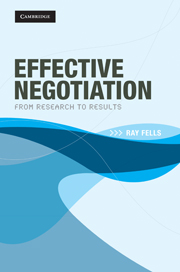Book contents
- Frontmatter
- Contents
- Acknowledgements
- 1 An introduction to negotiation
- 2 The essence of negotiation
- 3 Being strategic
- 4 The process of negotiation
- 5 Managing a negotiation
- 6 Dealing with differences
- 7 Exploring options
- 8 The end-game exchange
- 9 Negotiating on behalf of others
- 10 Cross-cultural negotiations
- Appendix 1 A preparation checklist
- Appendix 2 A negotiation review checklist
- Appendix 3 Self-reflection tools
- Appendix 4 The Strategy Framework
- Appendix 5 The Nullarbor Model
- Appendix 6 Managing competitiveness
- Appendix 7 Managing workplace negotiations
- Appendix 8 Managing a business negotiation
- Appendix 9 A culture checklist
- References
- Index
Appendix 6 - Managing competitiveness
- Frontmatter
- Contents
- Acknowledgements
- 1 An introduction to negotiation
- 2 The essence of negotiation
- 3 Being strategic
- 4 The process of negotiation
- 5 Managing a negotiation
- 6 Dealing with differences
- 7 Exploring options
- 8 The end-game exchange
- 9 Negotiating on behalf of others
- 10 Cross-cultural negotiations
- Appendix 1 A preparation checklist
- Appendix 2 A negotiation review checklist
- Appendix 3 Self-reflection tools
- Appendix 4 The Strategy Framework
- Appendix 5 The Nullarbor Model
- Appendix 6 Managing competitiveness
- Appendix 7 Managing workplace negotiations
- Appendix 8 Managing a business negotiation
- Appendix 9 A culture checklist
- References
- Index
Summary
It seems a good idea to use negotiation tactics which give you a competitive advantage except for the fact of reciprocity, which means the other negotiator will then try the tactics back on you.
We should note, though, that being competitive in the sense of wanting to do well is a positive, not a negative. The negative side surfaces when the negotiator stops being strategic and allows the desire to do well to drift into a desire to ‘do better out of this negotiation than the other party’. This is a polite way of saying ‘we must beat them so that they don't beat us’. It reflects the imagery of negotiation as a sporting contest.
Here are some competitive ‘hard ball’ tactics and some advice on how to handle them (the inference is that good negotiators will not resort to these tactics themselves). Since negotiation is about an issue and involves a process, competitiveness can be found in either dimension.
Competiveness on the issue
Negotiators can adopt a number of competitive issue strategies.
The tough stance negotiator
The other negotiator makes an extreme claim and you get the impression that any concessions will be small and a long time coming.
The essence of the strategy is to wear the other negotiator down and rely on the fact that the clear-cut concession strategy is the most common way of settling differences. By always making smaller concessions the outcome will be in their favour.
- Type
- Chapter
- Information
- Effective NegotiationFrom Research to Results, pp. 185 - 192Publisher: Cambridge University PressPrint publication year: 2009



